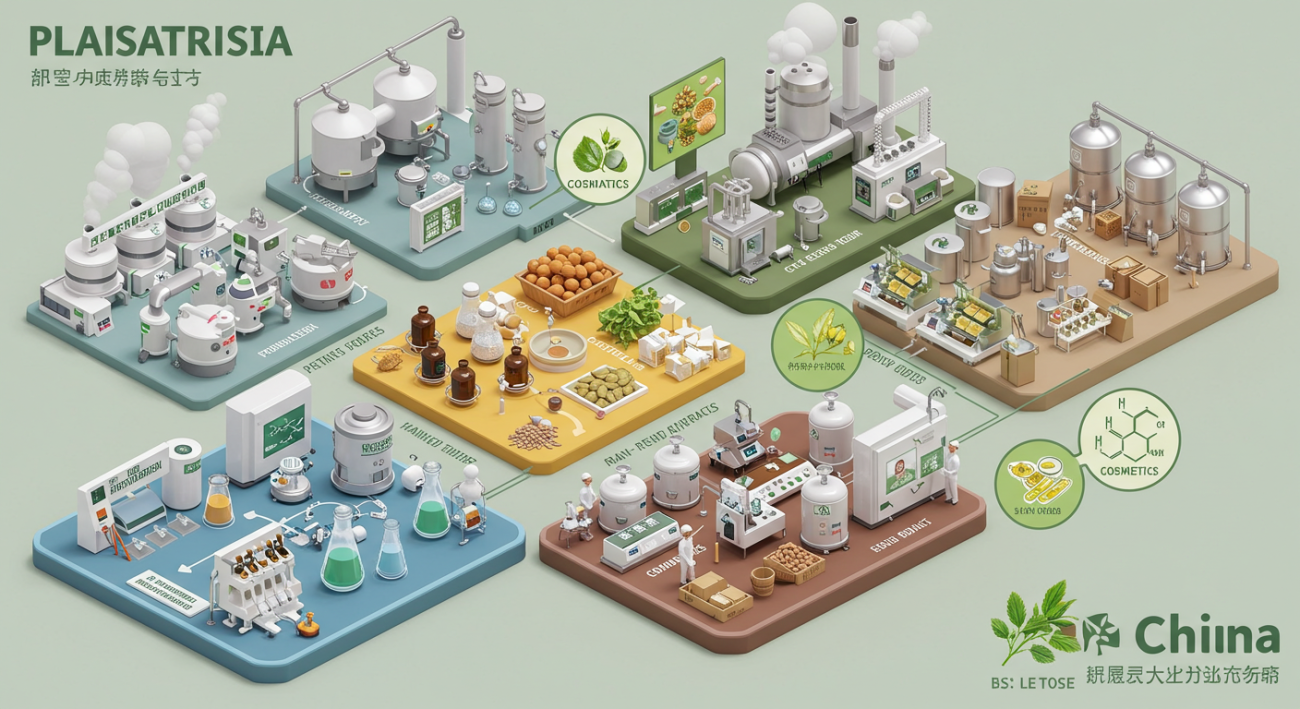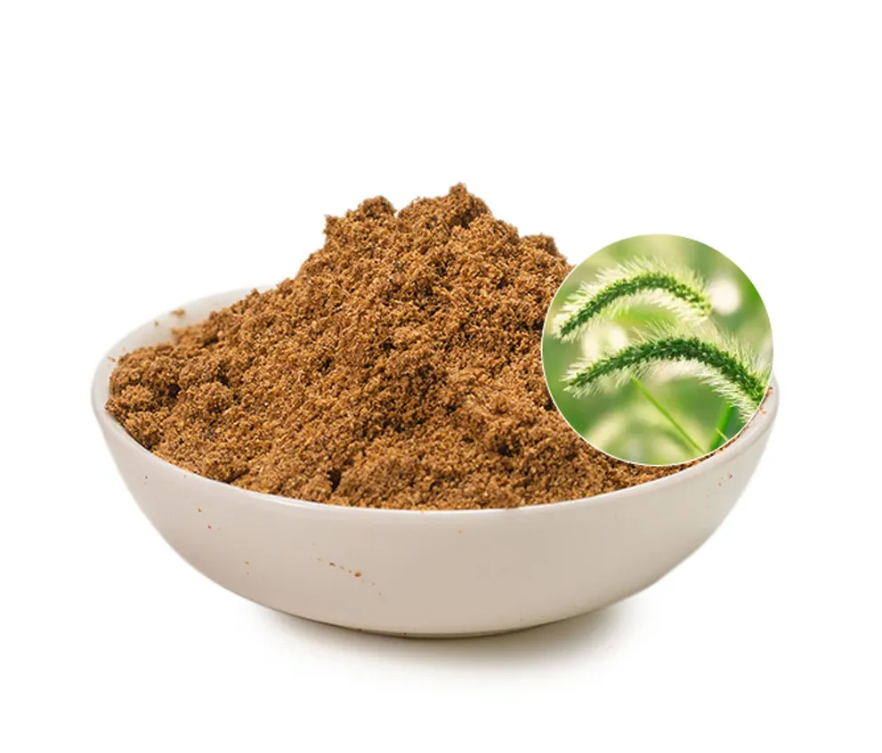Why are Extracts of Plants From China Popular?
- China still stands as one of the leaders in the global herbal market, and for a reason. With a rich understanding of Traditional Chinese Medicine (TCM) that dates back thousands of years, the country integrates ancient herbal knowledge with up-to-date extraction practices, making it a reliable supplier of plant extracts.
- Contemporary Chinese producers manufacture these products in GMP-licensed, ISO-certified Chinese plants, where safety and environmental care are a top priority. The variety of products, ranging from powdered herbs to full-spectrum extracts or even essential oils, makes it possible for modern companies in the domains of wellness, food, and pharmaceuticals to utilize these extracts.
What are the Key Industries Which Utilize Extracts of Plants From China?
- In the current international market, plant-based materials are not mere fads; they are effective functional ingredients that transform different industries. Since China is among the major producers and exporters of botanical extracts, numerous industries depend on these precious natural ingredients to formulate their products. Therefore, what industries principally utilize plant extracts from China? This comprehensive guide examines the what are the main industries that use plant extracts from China, their technical applications, procurement methods, and the innovative uses of Chinese botanical extracts in global advancement.
Primary Advantages of Procuring From China:
- Cost-efficient, yet powerful and pure ingredients.
- Comprehensive OEM and private label offerings.
- Widely available, rare, and native botanicals such as ginsenosides, rhodiola, and astragalus.
- Innovative extraction methods using CO₂ and low-temperature drying.
- Dependable and traceable sourcing with international certifications (GMP, ISO, Organic, COSMOS).
With this distinct combination of tradition, innovation, rigorous practices, and quality assurance, China is one of the world’s leading suppliers in the global botanical supply chain.
Leading Industries Utilizing Chinese Plant Extracts
1. Nutraceutical Industry
The nutraceutical segment can be considered the biggest market for Chinese botanical products. Plant extracts are key raw materials in the manufacture of capsules, powders, tablets, and liquid supplements such as:
• Ginseng (Energy, Immunity)
• Rhodiola (Adaptogen)
• Goji Berry (Antioxidant)
• Green Tea Extract (Fat Metabolism)
Chinese plant extracts are prized for their standardized actives, bioavailability, and longevity.
2. Pharmaceutical Manufacturing
In the pharmaceutical industry, plant extracts are utilized as Active Pharmaceutical Ingredients (APIs) or as supporting materials.
• Berberine (for management of blood sugar levels)
• Artemisinin (for treating malaria)
• Curcumin (anti-inflammatory agent)
These extracts are controlled to a high degree of regulation concerning the Chinese Pharmacopoeia, USP, EP, and other named pharmacopoeias. About quality assurance, these extracts are subjected to:
• Testing using HPLC, UV-VIS, and GC-MS
• Microbial tests and analysis of heavy metals
• Consistency over different batches
Pharmaceutical-grade herbal extracts, herbal ingredients from Chinese medicine, in pharmaceutical formulations

3. Cosmetics & Personal Care
Brands focused on clean beauty and natural cosmetics utilize plant extracts of China for: Skin brightening with licorice and arbutin, ginkgo and astragalus for anti-aging, and for anti-acne and anti-inflammation tea tree and centella asiatica. Extracts are added into Creams and lotions, serums and essences, and shampoos and hair treatments. These Chinese suppliers hold organic and non-GMO certifications for their allergen-free herbal extracts, often certified by COSMOS and Ecocert.
4. Functional Foods & Beverages
The use of herbal extracts in functional foods and beverages enhances their:
- Flavor
- Nutritional value
- Health-related benefits
These include:
- Herbal teas, honeysuckle, and chrysanthemum
- Bars and snacks with added nutrients
- Drinks fortified with cordyceps, goji, or schisandra
Functional food brands select China due to its greatest variety, bulk extract options, and cost-effective sourcing.
5. Aromatherapy and Wellness
Chinese essential oils and volatile plant extracts are extensively incorporated into:
- Home and Diffuser scents
- Massage and bath products
- Oils for stress relief and focus enhancement
Some common essential oils are:
- Eucalyptus
- Peppermint
- Ginger
- Lavender, which is grown in Western China.
These suppliers offer steam-distilled and solvent-free oils, which retain the aromatic and therapeutic qualities of the essential oils.
6. Spa, Holistic & Herbal Therapies
Traditional and contemporary Ayurvedic and TCM clinics utilize Chinese herbal medicine within natural therapies such as:
• Herbal compresses and wraps
• Detox foot soaks
• Pain relief balms
• Tonic drinks and herbal decoctions
These industries value whole extracts for the broad scope of benefits and synergy of healing constituents they provide.
Future Market Trends & Increasing Supply Needs
Driven by growing awareness of health, wellness, and sustainability, the plant-based ingredient market is booming globally. Clean-label and natural, chemical-free products are in high demand across industries, spanning supplements all the way through to skincare. Faced with this increasing need, suppliers of plant extracts in China are innovating more quickly than ever. There is now:
- Ingredients of botanicals that are certified organic
- Sources of plants that are non-GMO and free of allergens
- Extraction processes that are eco-friendly and free of harmful solvents
- Extensive OEM and private labeling for global brand partners
What are the main industries that use plant extracts from China? For brands striving for clean, green formulations, this places China strategically as a reliable sourcing hub and a cost-effective option at the same time. Thanks to scale, quality, and due to constant innovative trends and regulations, China is the global supply chain for botanicals.
Reasons Chinese Suppliers are Trusted by Leading Brands
When properly vetted, suppliers of plant extracts from China can be trusted to deliver:
- High purity and potency
- Batch consistency
- Comprehensive quality documentation (COAs, SDS, lab tests)
- OEM and private label services.
- GMP, ISO, HACCP, and organic certifications.
China’s Position in the Global Botanical Supply Chain
What are the main industries that use plant extracts from China? The answer is that, from the pharmaceutical industry to personal care, it is almost all industries focus on safe, functional, and naturally derived ingredients. Herbal exports from China meet the global needs and innovations in botanicals, and play an important role in the herbal export trade.
Conclusion:
Provided that diligent research is carried out and reputable suppliers are chosen, manufacturers can greatly improve products using Chinese plant extracts known for their unparalleled potency, purity, and authenticity. Looking for a trustworthy partnership in herbal ingredient sourcing? Reach out to us at B-Thriving for customized solutions with compliant documentation and traceable herbal ingredients.

